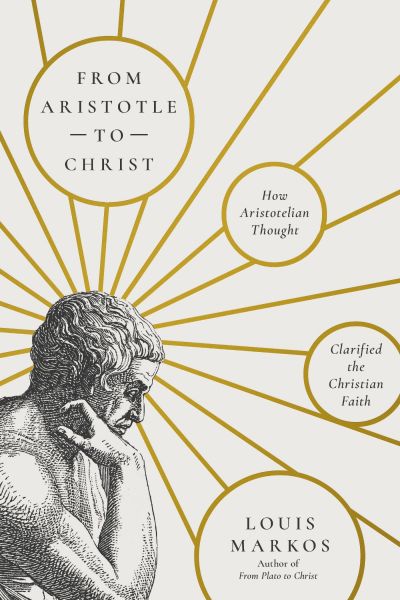From Aristotle to Christ
How Aristotelian Thought Clarified the Christian Faith
Discover how Aristotelian thought has shaped Christianity through history and remains relevant for Christians today
When Christians of any age, country, or denomination debate the nature of the good life, the soul, free will, or design, Aristotle lies behind their logic as well as their rhetoric. Although Aristotle did not have access to the Bible's special revelation, he made full use of general revelation to arrive at deep truths about the nature of God, human identity, and the universe. In the Catholic Middle Ages the spiritual vision that undergirded Dante's Divine Comedy was strongly indebted to Aristotle's cosmology, and in the Protestant Reformation and Enlightenment the social vision of a well-run state was equally indebted to his political science.
In a follow up to his well-loved book From Plato to Christ, renowned scholar Louis Markos takes us on a vigorous and celebratory journey through the work of Plato's greatest student, demonstrating Aristotle's often unacknowledged influence on the Christian faith. In Markos's hands, Aristotle is far from an irrelevant ancient philosopher but is instead an important conversation partner for some of history's greatest Christian thinkers and a thoughtful guide to today's most challenging questions.
With this book, you'll:
- Consider the influence of Aristotle's thought on the Christian faith,
- Carefully analyze several of Aristotle's best-known texts,
- Trace Aristotle's influence upon many key theologians in Christian history, and
- Understand Aristotle's continuing importance for Christians today.
This book is a perfect addition to any classroom that seeks to understand how classical thought intersects with Christianity, both past and present. Grab your copy today and explore the relationship between Aristotelian philosophy and Christianity.
Louis Markos (PhD, University of Michigan) is professor in English and scholar in residence at Houston Christian University, where he holds the Robert H. Ray Chair in Humanities. His 27 books include The Myth Made Fact; From Plato to Christ; From Achilles to Christ; Ancient Voices: An Insider's Look at Classical Greece; Heaven and Hell; Apologetics for the 21st Century; Atheism on Trial; and Passing the Torch: An Apology for Classical Christian Education. He has published over 300 essays and given over 300 public lectures. He is committed to the concept of the professor as public educator. He has two grown children and lives in Houston, Texas.
Preface: A Platonist Learns to Love Aristotle
A Note on Translation
Part 1: How to Think Logically
1. Why It's Impossible to Believe Six Impossible Things Before Breakfast
2. Playing Around in Aristotle's Toolbox
3. Making Arguments That Make Sense
4. Why Things Move and Change
5. Body and Soul in Dialogue
Part 2: How to Read the Heavens and the Earth
6. Why, Why, Why
7. Where Do I Begin?
8. Wrestling with the Static God of Deism
9. Living in an Ordered Universe
10. Joining the Cosmic Dance of
Part 3: How To Behave
11. Studying the Psyche
12. Virtue as Habit
13. Finding the Golden Mean
14. How to Win Friends and Influence People
15. The Good Life
Part 4: How to Get Along with Our Neighbors
16. The Political Animal
17. A Critic and a Defender of Aristotle
18. The Blessings and Dangers of Private Property
19. The Rule of Law
Part V: How to Make Beautiful Things
20. Defending the Art of Rhetoric
21. Redeeming the Art of Imitation
22. Purging and Purifying the Emotions
Conclusion: Aristotle the Prophet
Glossary
Bibliographical Essay
Scripture Index
"Louis Markos has done it again! If anything, this book is even more valuable than his earlier From Plato to Christ. Plato is generally easier to read, and so Aristotle is more in need of retrieval. Markos shows that, while there are places where Aristotle needs correction, his thought is immensely helpful for Christian reflection on God, human nature, virtue, friendship, politics, and rhetoric. May this book receive the wide audience it deserves, for the benefit of biblically grounded Christian faith and culture."
"When one studies the early church mothers and fathers, their debt to Plato is obvious. Unfortunately, few students and scholars continue reading into the high Middle Ages, where Aristotle's thought becomes dominant, especially among the scholastic theologians, giving the impression that Plato's influence is foremost in the history of Christian thought. Louis Markos shows how Aristotle's influence is not just in scholasticism but all over the Christian tradition, reminding us that we owe a great debt to Aristotle too. This accessible book should be read by everyone interested in theology."
"I have been waiting a long time for a book like this one. We live in a difficult era, caught as we are between two extremes. On the one hand, radicals will tell us that if we listen to Aristotle, we will corrupt Christianity. On the other hand, modernism will tell us that we must dispense with Aristotle for the sake of revisioning classical Christianity. Against the radicals, we would do well to remember that our Protestant scholastic forefathers, many of whom were responsible for our Protestant confessions, critically appropriated Aristotle to further fortify the pillars of theology. Against modernism, Aristotle could not be more relevant, assisting us with the tools required to keep at bay everything from monism to materialism. The beauty of Louis Markos's book is the way he introduces the novice to the wisdom of Aristotle to better equip Christianity with a defense of its foundational commitments. In a secular age prone to skepticism, what student can afford not to read Markos and consider the myriad ways Aristotle can clarify what we believe and why?" weniger anzeigen expand_less
Versandkostenfreie Lieferung! (eBook-Download)
Als Sofort-Download verfügbar
- Artikel-Nr.: SW9781514011331110164
- Artikelnummer SW9781514011331110164
-
Autor
Louis Markos
- Wasserzeichen ja
- Verlag IVP Academic
- Seitenzahl 288
- Veröffentlichung 23.09.2025
- Barrierefreiheit
- ISBN 9781514011331

